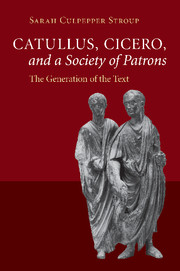Book contents
- Frontmatter
- Contents
- Preface and acknowledgments
- List of abbreviations
- Introduction
- I HOW TO WRITE ABOUT WRITING
- II THE TEXTUALIZATION OF DISPLAY
- III THE MATERIALIZATION OF THE TEXT
- 7 An object of Catullan affection
- 8 Brutus: the dialogic personification of the Republican voice
- Epilogue
- Appendix: What “Society of Patrons”? A prosopography of the players
- Bibliography
- Index locorum
- Index rerum et nominum
7 - An object of Catullan affection
Published online by Cambridge University Press: 04 August 2010
- Frontmatter
- Contents
- Preface and acknowledgments
- List of abbreviations
- Introduction
- I HOW TO WRITE ABOUT WRITING
- II THE TEXTUALIZATION OF DISPLAY
- III THE MATERIALIZATION OF THE TEXT
- 7 An object of Catullan affection
- 8 Brutus: the dialogic personification of the Republican voice
- Epilogue
- Appendix: What “Society of Patrons”? A prosopography of the players
- Bibliography
- Index locorum
- Index rerum et nominum
Summary
MORE THAN JUST TEXTS: FETISH AS “ACTING OBJECT”
That Catullus is an author deeply invested in the variously figured homosocial relationships between reader and poet has been well established, as has his use of exchanged uersiculi in the poetics of both an elite Roman manhood and his own self-positioning in the lyric construction of such.1 The studies of, for example, Fitzgerald, Janan and D. Wray have greatly advanced our understanding of a late Republican “literary masculinity,” and have established Catullus as an author of wide-reaching import and influence for later modes of poetic communication and homosocial negotiation. These studies have helped to reconstruct the homosocial aesthetic of the late Republican textual world and have provided much of the theoretical foundation upon which my discussions in the following sections are constructed. What I want to do in this chapter, however, is to take poems that have been noted for their function as creators (and challengers, and products) of “literary masculinity,” resituate them in terms of the late Republican textual world, and consider how they functioned in this world qua their status – one that is often emphasized by Catullus – as variously materialized, “givable” objects.
The theme of poetic materiality and textual exchange – of giving the “textual gift” – runs intermittently throughout the Catullan corpus, and it might reasonably be argued that any of the poems that address or allude to a second party might be seen as contributing to the ongoing creation of the late Republican textual world.
- Type
- Chapter
- Information
- Catullus, Cicero, and a Society of PatronsThe Generation of the Text, pp. 216 - 236Publisher: Cambridge University PressPrint publication year: 2010

